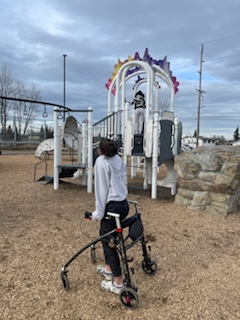Field Sessions on Inclusive Play with King Tech
- Admin
- Aug 11, 2024
- 2 min read
In the spring of 2024 local play space planning and design experts connected with Anchorage’s King Tech High School Early Childhood Education (ECE) students on the topic of inclusive play, universal design, and the impact of design on child (and community!) development. King Tech HS instructor Molly Hayes hosted the first session in her classroom with invited guests Taylor Keegan (Landscape Architect, MOA Parks and Recreation + Alaska Chapter ASLA), Jonny Hayes (Landscape Architect, Anchorage Museum + Alaska Chapter ASLA), and local inclusive play legend Leah Boltz (Principal, Bettisworth North) to share short presentations about their expertise and experiences creating community assets in alignment with what students were learning as part the child development curriculum.
Excerpts from the State of Play in the MOA and the Power of No Fun were augmented by universal design strategies, observations and shared experiences in play space settings. Students discussed their educational experiences working with preschoolers each day and connected their physical, cognitive, and social development to the school’s spaces and activities. A few days later Ms. Hayes and the King Tech students were again joined by Taylor, Leah, and Jonny on a guided site tour of Anchorage’s inclusive play spaces located at Chanshtnu Muldoon (designed by Bettisworth North) and Russian Jack Springs Parks (designed by Corvus Design).
Students and guides discussed the strategies of the design, the planning and public
engagement process, and highlighted key features and design solutions that worked to support the community in an inclusive way. Topics of discussion included selection and placement of equipment to support age appropriate child development and varied experiences, types of play safety surfacing and arrangement of equipment to eliminate physical barriers for participation, and incorporating features that encourage intergenerational play (and supervision) to create a more robust and welcoming community asset within a public park setting. Physical intervention equipment was made available so users might briefly experience various blindness and visual impairment conditions and mobility challenges. As part of the experience the students were tasked with completing the Anchorage Parks and Recreation Inclusive Play Report Card for each space, which is a tool created by Taylor to observe, evaluate and help guide planning and improvements within the Municipality of Anchorage.
The students shared positive feedback and a real enthusiasm to ‘play’ while learning about local inclusive play efforts and how they might advocate and participate in planning and projects that support community. The Alaska Chapter ASLA greatly appreciates the opportunity to connect with local students and educators and invites community members to contact the Chapter to learn about potential pathways for sharing information and experiences that advances inclusive play.
This post was written by our Trustee, Jonny Hayes.











Comments